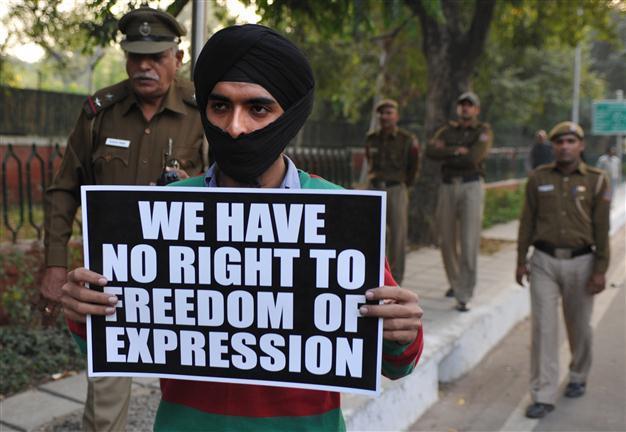India gov't agrees to prosecute Google, Facebook
NEW DELHI - Reuters

An activist of Bhagat Singh Kranti Sena hold placards and roses outside the residence of Communications and IT Minister Kapil Sibal in New Delhi on December 7, 2011. AFP Photo
India's government authorised on Friday the prosecution of 21 Internet firms including
Facebook and Google in a case over obscene content posted online, two sources told AFP.
The approval will lead to company directors being called to a trial court in New Delhi to answer serious charges such as fomenting religious hatred and spreading social discord, an official and a lawyer said.
Internet giants including Google and Facebook were embroiled in a growing battle in India over offensive content with a judge warning websites may be blocked "like in China", stoking worries about freedom of speech in the world's largest democracy.
The Delhi High Court had a hearing on Monday of an appeal by Google, Facebook and others against a lower court case by a private petitioner seeking to remove images considered offensive to Hindus, Muslims and Christians from websites.
"The lower court gave a ruling asking the companies to take down some content, we appealed that ruling and it is in the higher court," said a Google spokesman in India on Friday.
A law passed last year in India makes companies responsible for user content posted on their websites, requiring them to take it down within 36 hours in case of a complaint. The lower court affirmed the law last week.
"If a contraband is found in your house, it (is) your liability to take action against it," Justice Suresh Kait told lawyers from Facebook India and Google India on Thursday, according to the Economic Times newspaper.
"Like China, we can block all such websites (that don't comply). But let us not go to that situation."
Less than 10 percent of India's 1.2 billion people have Internet access, though the connected population is rapidly growing through social media tools on mobile phones, bringing many into contact for the first time with images intended to offend.
More than 880 million people have mobile phones in India, but more expensive Internet-capable 3G models are out of reach for many.
Civil rights groups opposed the laws, but politicians say that posting offensive images in the socially conservative country with a history of violence between religious groups presents a danger to the public as Internet use grows.
In December, Telecoms Minister Kapil Sibal weighed into the debate, urging Facebook,
Twitter, Google and others to remove offensive material.
Despite rules to remove offensive content, India's Internet access is still largely free when compared with the tight controls in fellow Asian economic powerhouse China.
The India units of Facebook, Yahoo! Inc and Microsoft Corp declined to comment.
Lawyers for the companies appeared in the lower court on Friday, but the judge adjourned the proceedings until March, Vinay Rai, the petitioner, told Reuters by phone.
censorship, internet,
